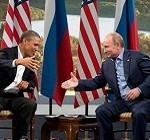Russian President Vladimir Putin’s unprecedented open letter to Americans in The New York Times has stalled the march of the American ‘world police’ and in doing so, saved U.S. President Barack Obama from destroying the credibility of his own anti-war movement. Putin’s letter titled ‘A plea for caution from Russia’ addresses U.S.-Russian relations, the growing impotence of the U.N. and why the use of force is not the solution to Syria’s crisis before launching a gentle but pointed attack at American Exceptionalism — the pompous idea that Americans are in some way exceptional and ‘qualitatively different’ compared to the rest of the world, and that the U.S. is a shining ‘City on the Hill’ exempt from the influence of historical forces and precedents.
The letter tactfully steered clear of directly pointing out that the U.S. has been the ‘exception’ in terms of being the first to use chemical weapons and the only country to use nuclear weapons, a fact that the rest of the world has also been too polite to mention through the multiple hunts for WMD in this past decade. Why Obama did not find his rather accommodating ‘red line’ crossed during two years of massacre of over 100,000 Syrians and displacement of nearly 6 million others, is unclear. Putin’s plea went some way towards conveying the world’s position on Syria and depicting Russia as a relevant player on the world stage. While the Russian President has given the Nobel Peace Laureate an escape route by which to save face internationally as well as among his citizens and the Congress, it is a credit to Obama that he agreed to back down from his pro-military intervention position. Additionally, the U.S.-Russia agreement on how to approach the Syrian crisis signifies a marked change in the relationship and discourse between the two Cold War rivals, with U.S. Senator John McCain now keen to follow suit and write a letter of his own in the Russian government’s mouthpiece Pravda.
Inadvertently, Putin’s proactive missive has also been beneficial to the Chinese, who will not need to voice their opposition to the military intervention in Syria and can watch from the sidelines as Russia takes the lead and defends their anti-interventionist stand. While Putin’s motivations may not necessarily be altruistic, he has taken a step in the right direction and stopped or at least delayed another conflict with the potential to further de-stabilise West Asia. Whether or not Syria complies and dismantles its chemical weapon arsenal, one thing is certain. The Russian premier has played a big diplomatic card, worthy of an astute statesman and a peacemaker, far removed from his tainted track record in dealing with unrest in Russia as well as former Soviet republics.
This blog was exclusively written for Gateway House: Indian Council on Global Relations. You can read more exclusive content here.
For interview requests with the author, or for permission to republish, please contact outreach@gatewayhouse.in.
© Copyright 2013 Gateway House: Indian Council on Global Relations. All rights reserved. Any unauthorized copying or reproduction is strictly prohibited


